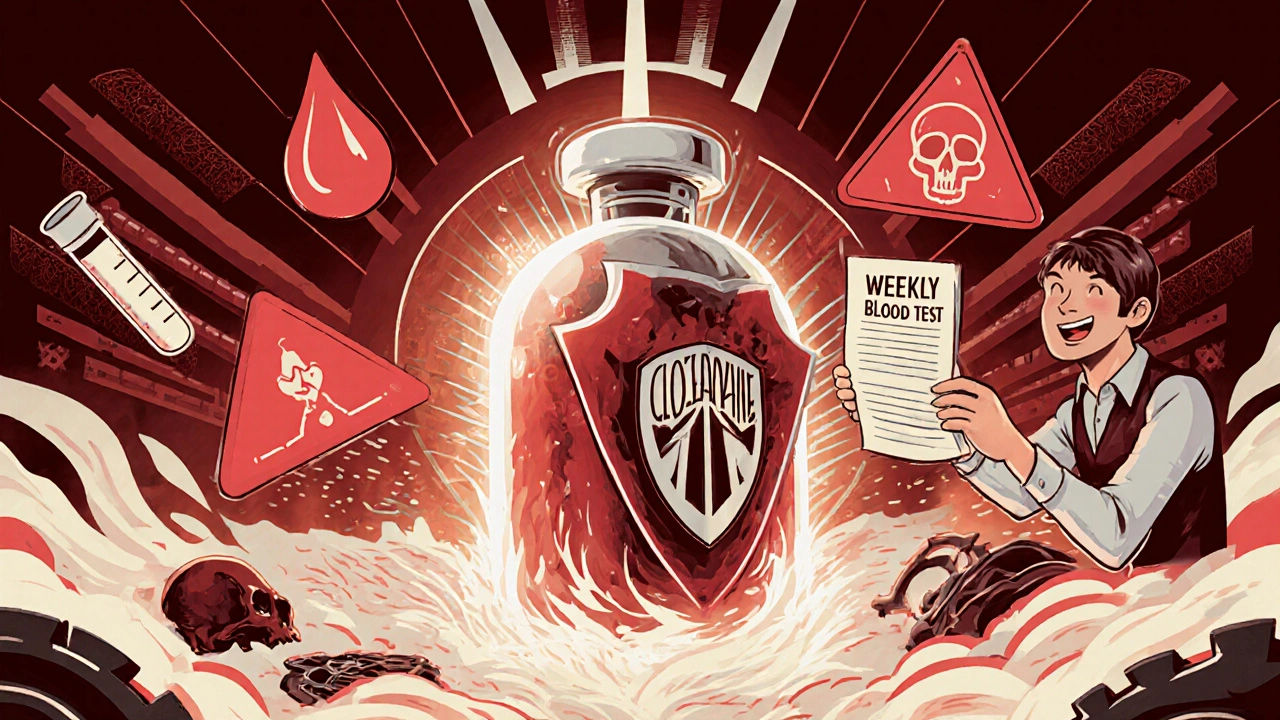When someone is diagnosed with schizophrenia, one of the first questions they or their family asks is: What medication will help? The answer isn’t simple. Antipsychotic drugs have been the backbone of treatment for decades, but not all are the same. Some work better for certain people. Some cause more weight gain. Others make you restless. Some require weekly blood tests. Choosing the right one isn’t just about symptoms-it’s about your life.
Two Generations of Antipsychotics
There are two main types of antipsychotic medications: first-generation (FGAs) and second-generation (SGAs), also called atypical antipsychotics. The first ones, like haloperidol and chlorpromazine, came out in the 1950s. They block dopamine, a brain chemical linked to hallucinations and delusions. But they often cause serious movement problems-tremors, stiffness, or an inability to sit still. About 30 to 50% of people on these drugs experience these side effects.Second-generation antipsychotics, developed starting in the 1980s, changed the game. They still affect dopamine, but they also act on serotonin. This dual action means they’re less likely to cause movement issues. Drugs like risperidone, olanzapine, quetiapine, and aripiprazole became the go-to options. By 2022, 85% of all antipsychotic prescriptions in the U.S. were for these newer drugs, according to IQVIA data.
Why Atypical Antipsychotics Are First-Line
Current guidelines from the American Psychiatric Association recommend SGAs as the first choice for most people with schizophrenia. Why? Better tolerability. While both types can reduce hallucinations and delusions, SGAs have a much lower risk of causing tardive dyskinesia-a permanent movement disorder that can develop after years of use. They also tend to help more with emotional flatness and social withdrawal, which are harder to treat than positive symptoms like voices.But that doesn’t mean they’re perfect. Many SGAs cause weight gain, high blood sugar, and high cholesterol. Olanzapine and clozapine are especially likely to lead to significant weight gain-sometimes over 4 kilograms in the first year. Quetiapine isn’t far behind. For someone trying to manage their health, this can be devastating.
Clozapine: The Last Resort That Works
Clozapine is the most powerful antipsychotic for treatment-resistant schizophrenia. If two or more other drugs haven’t helped, clozapine is the next step. Studies show it reduces symptoms in 30 to 50% of people who didn’t respond to anything else. One patient shared on Mind.org.uk: “After five failed medications, clozapine gave me my life back-even with the blood tests.”But it comes with a major risk: agranulocytosis, a dangerous drop in white blood cells that can leave you vulnerable to infections. That’s why anyone taking clozapine must get weekly blood tests for the first six months. Even with this monitoring, the risk is still 1 to 3%. In the U.S., the Clozapine REMS program tracks every prescription and test result. It’s a hassle, but for many, it’s worth it.
Which One Works Best?
A 10-year study of over 17,000 patients found that clozapine kept people on treatment the longest-nearly 17 months on average. Aripiprazole came second, at over 10 months. Haloperidol, a first-generation drug, had the shortest duration-just under 4.5 months. People stopped taking it because of side effects.Another study of nearly 28,500 patients showed that at 12 months, only 18.2% of those on aripiprazole had a relapse, compared to 29.7% on haloperidol. That’s a 39% lower risk. Aripiprazole also causes less weight gain than most SGAs-only about 0.6 kilograms on average. That’s why many doctors start with it, especially in younger patients.
But here’s the catch: no single drug is best for everyone. A 2023 analysis by Dr. Stefan Leucht showed that while all antipsychotics prevent relapse similarly, their side effects vary wildly. One person’s miracle drug is another’s nightmare.
Side Effects You Can’t Ignore
Weight gain isn’t just cosmetic. It raises the risk of diabetes and heart disease. A 2022 study found that 35% of people on SGAs develop metabolic syndrome. That’s why doctors often prescribe metformin alongside antipsychotics-it can cut weight gain by nearly 4.2 kilograms in six months.Movement side effects still happen, even with atypical drugs. Risperidone causes them in about 18% of users. Aripiprazole causes akathisia-a feeling of inner restlessness-in up to 40% of new users, according to Reddit users sharing their experiences. That can make people feel like they can’t sit still, even when they’re exhausted.
Sedation is another big issue. Olanzapine and quetiapine are very sleepy. Some people take them at night to help with insomnia, but daytime drowsiness can ruin work or school. One Reddit user wrote: “I couldn’t focus on my job. I was just zoning out all day.”
Long-Acting Injections: A Game Changer
Taking a pill every day is hard. For many, forgetting a dose means symptoms come back. That’s why long-acting injectables (LAIs) are growing in popularity. Paliperidone palmitate, given once a month, has been shown to cut relapse rates by 22% compared to daily oral risperidone. In Europe, 30% of new antipsychotic prescriptions are now injections. In the U.S., it’s 25%.LAIs remove the guesswork. You don’t have to remember pills. You don’t have to hide them. And studies show better adherence-people stay on treatment longer. That’s huge for someone trying to rebuild their life.
What About New Drugs?
The future of schizophrenia treatment is changing. In 2023, the FDA approved lumateperone for bipolar depression with schizophrenia. It works differently-it doesn’t block dopamine the same way. It showed good results with almost no weight gain.Two drugs in late-stage trials are especially promising. KarXT combines xanomeline and trospium to target muscarinic receptors, not dopamine. In one trial, it reduced symptoms by 9.6 points on a standard scale-far more than placebo. SEP-363856, a new type of drug called a TAAR1 agonist, cut symptoms by 8.9 points with only 2% weight gain, compared to 4.2kg with olanzapine.
There’s also ALKS 3831, a combo of olanzapine and samidorphan. It cuts the weight gain from olanzapine by 63%. These aren’t just new pills-they’re new ways of thinking about treatment.

Personalizing Treatment
The best treatment isn’t one-size-fits-all. Your genetics matter. About 37% fewer side effects occur when doctors test for CYP2D6 and CYP1A2 gene variants before prescribing. Some people metabolize drugs too fast-meaning the drug doesn’t work. Others metabolize too slow-meaning they get too much and have side effects.Age, weight, other health conditions, and even diet matter. Ziprasidone must be taken with at least 500 calories to be absorbed. Quetiapine can cause low blood pressure if you stand up too fast. Aripiprazole can trigger mania in people with bipolar disorder.
Doctors don’t always have all the info. UpToDate has 98% complete dosing guidelines. FDA labels? Only 67%. That’s why patient feedback matters. Reddit’s r/antipsychotics has 48,000 members sharing titration tips, side effect management, and what really works.
Why People Stop Taking Their Medication
The National Alliance on Mental Illness found that 63% of people stop their first antipsychotic within six months. Why? Sedation (28%), weight gain (24%), and movement problems (18%). It’s not that the drugs don’t work-it’s that the side effects make life harder than the illness.But clozapine users? They stick with it. Even with blood tests, 71% are still taking it after a year. Why? Because it’s the only thing that worked. For them, the trade-off is worth it.
What Comes Next?
Treatment resistance affects 30% of people with schizophrenia. Even clozapine doesn’t work for everyone. In the OPTiMiSE trial, only 40% responded to optimized clozapine doses. Some needed electroconvulsive therapy. Others still struggle with severe symptoms.But new tools are emerging. Digital therapeutics-apps that track mood, sleep, and medication adherence-can reduce symptoms by 25% when used with medication. Precision medicine is becoming real. Pharmacogenetic testing is no longer experimental-it’s practical.
There’s no magic bullet. But there’s more hope than ever. The goal isn’t just to silence voices. It’s to help people live. And that means matching the right drug to the right person-not just the most popular one.


Connor Moizer
November 15, 2025 AT 22:55Man, I’ve been on aripiprazole for three years now. The akathisia? Still there. Feels like my bones are vibrating. But I’d rather be restless than zombied out on olanzapine. At least I can hold a job. My cousin? She gained 60 pounds on quetiapine and couldn’t even walk to the fridge. Medication isn’t magic-it’s a trade-off you make every damn morning.
kanishetti anusha
November 16, 2025 AT 23:28I’m from India and my brother started on risperidone. We didn’t even know about LAIs until his doctor mentioned it. Now he gets monthly injections. No more forgetting pills. No more guilt. He’s sleeping through the night for the first time in years. It’s not perfect, but it’s a lifeline.
Liam Dunne
November 18, 2025 AT 10:48Just want to add-metformin isn’t just for weight. It helps with insulin resistance too. I was on olanzapine for 18 months, gained 12 kilos, and my fasting glucose was borderline diabetic. Started metformin, lost 8 kilos in 5 months, and my doctor said my numbers are normal now. Don’t just accept the weight gain. Ask for help.
Vera Wayne
November 18, 2025 AT 11:47Can we PLEASE stop pretending all SGAs are ‘better’? Aripiprazole causes akathisia in 40% of users? That’s not ‘mild’-that’s torture. And clozapine? Yes, it works-but only if you can survive the blood tests, the drooling, the constipation, and the fear that your next CBC will be your last. We need better options. Not just ‘different’ ones.
Willie Randle
November 18, 2025 AT 23:57Pharmacogenetic testing is not a luxury-it’s a necessity. I’m a CYP2D6 poor metabolizer. Took a standard dose of haloperidol and ended up in ER with dystonia. My doctor had no idea. If they’d tested me first, I’d have avoided six months of hell. This isn’t sci-fi. It’s science. Demand it.
Patrick Merk
November 20, 2025 AT 09:19My mate was on clozapine for five years. Weekly bloods? Yeah. But he’d say, ‘It’s the only thing that let me laugh again.’ He’s now a peer support worker. That’s the real win-not just symptom control, but life returning. We need more stories like his, not just stats.
roy bradfield
November 21, 2025 AT 17:05They’re hiding the truth. Big Pharma doesn’t want you to know that antipsychotics were originally developed to control ‘unruly’ patients in asylums. The whole system is built on suppression, not healing. The ‘new’ drugs? Just rebranded chains. The FDA approves them because they’re profitable, not because they’re safe. Wake up. The real cure is community, not chemicals.
Rodney Keats
November 22, 2025 AT 18:57Oh wow, a 9.6-point reduction on a scale? That’s, like, the difference between hearing voices and hearing a podcast. Congrats, Big Pharma. You turned psychosis into a marketing metric. Next up: antipsychotic NFTs.
Laura-Jade Vaughan
November 23, 2025 AT 09:14OMG I just read this and cried 😭. My sister is on lumateperone and it’s literally changed her life. No weight gain, no sedation, she’s back in college. I’ve been begging everyone to read this. This is hope. This is progress. 🙏✨ #AntipsychoticsAreNotTheEnemy
Parv Trivedi
November 25, 2025 AT 06:02Thank you for writing this. As someone who’s watched two family members struggle with this, I can say: the real victory isn’t the drug that silences voices. It’s the one that lets someone sit with their mother again, or finish a sentence without staring into space. Let’s stop talking about side effects like they’re just inconveniences. They’re life-stealers. And we need to fight for better.